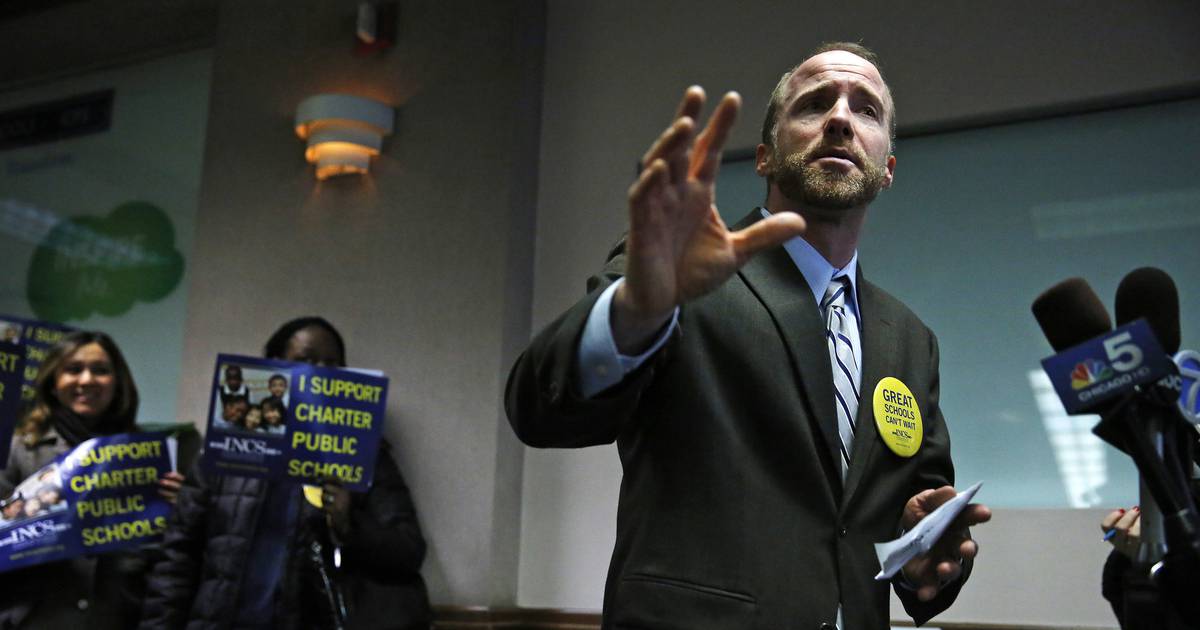Super PACs aren’t just spending big in this year’s mayoral campaign, they’ve so far dropped more than $1 million in ward races, in some cases rivaling what candidates raised on their own.
Three Super PACs — representing charter schools, realtors, and pro-business allies of former Mayor Rahm Emanuel — have spent more than $1.2 million on aldermanic races this cycle, largely on behalf of moderate incumbents or newcomers aligned with the PACs’ interests.
Super PACs, also known as independent expenditure committees, are prohibited from coordinating with campaigns, meaning a candidate can’t directly influence a PAC’s message. But the interest groups aligned with those PACs can — and do — send out questionnaires and hold interviews with candidates to gauge whether their interests align.
The Illinois REALTORS Fund, which is funded by the Chicago, Illinois and National Associations of Realtors, has spent more than $400,000 supporting 20 aldermanic candidates via digital ads, mailers and field organizing. That sum surpasses what the group spent on aldermanic races at this point in the 2019 election cycle and its overall spending in 2015 races.
In the six-way race to succeed retiring Ald. James Cappleman in the 46th Ward, Kim Walz, a former staffer for Rep. Mike Quigley who’s now a regional manager for Walgreens, has benefited from about $65,000 in spending by the Realtors Fund.
The group has spent about $66,000 supporting 48th Ward candidate Andre Peloquin, a residential real estate broker, and roughly $56,000 supporting 4th Ward candidate Ebony Lucas, a real estate attorney.
Lightfoot appointees to the City Council — Monique Scott, 24th, Timmy Knudsen, 43rd, Anabel Abarca, 12th, and Nicole Lee, 11th — benefited from tens of thousands of dollars in spending by the realtor PAC as well.
Illinois Realtors CEO Jeff Baker, who is also chair of the Super PAC, said that for the association’s 18,000 members working in Chicago, there’s a lot at stake with the historic turnover on the City Council.
That includes a “decadeslong worsening” of the city’s housing shortage that he said is making it harder for low- and middle-income earners to own. That, in turn, drives up rental demand and prices. The group’s concerns include continued property tax increases, a potential hike in the real estate transfer tax and aldermanic support for state legislation that would lift the ban on rent control.
The group sends out questionnaires and interviews candidates to “gather as much research and information as possible. At that point, the doors close, the walls go up. The association and its relevant political committees decide what we want to do, if we’re going to do anything,” Baker said.
Its messaging is only positive, he points out, and focuses on a range of economic issues, not just property taxes. “Unlike some other Super PACs where you may not be sure who’s giving, in our case, 100% of our funding is realtors,” Baker said.
Of the super PACs active in the mayoral race, two supporting Rep. Jesús “Chuy” García and former CPS CEO Paul Vallas appear to be funded by “dark money,” where the individual contributor is not disclosed and the source of the money is unknown or heavily obscured.
The realtors group is spending heavily in the 46th Ward, which has a long tradition of contentious debates over housing, because two candidates — Marianne Lalonde and Angela Clay — both support lifting the ban on rent control, Baker said.
Walz’s “concern for the burden on property owners and housing providers while also providing adequate, safe, suitable housing for renters in the city” earned the PAC’s support, Baker said. Walz will not rely on “property taxes as this endless well of financial support for the city and not continuously looking to overburden property owners with regulation,” he said.
The PAC’s level of spending is “hugely impactful,” Lalonde told the Tribune, estimating one third of her time as a candidate is spent on fundraising. Lalonde started 2023 with about $80,000 cash on hand, according to the state elections board. In a short span, the Realtors sent out four mailers supporting Walz, highlighting not only her support for “housing options for all residents of the 46th Ward” but also her work with Walgreens during the pandemic and on prescription drug pricing.
Lalonde did not respond to the Realtors questionnaire, but said she supports lifting the rent control ban statewide not to mirror rules in place in San Francisco or New York, but to address “unfettered increases” that have displaced her neighbors.
She said hopes to protect the income diversity the ward is known for and agrees the current “dependence on property taxes for city revenue is kind of out of control.” If elected, she said she would slow the approval of further luxury developments, citing the thousands of higher-end studio and one bedroom rental units coming online soon.
The INCS Action Independent Committee, a Super PAC associated with the Illinois Network of Charter Schools, has so far spent $270,000 on mailers and digital ads for just five candidates. That’s far less than at this point in the 2019 cycle, when they spent just over $440,000 supporting or opposing 17 candidates.
Some of the candidates they supported in 2019 either lost their races or are retiring. Losing candidates included Pat O’Connor in the 40th Ward and Joe Moore in the 49th. Ald. Ariel Reboyras, 30th, and Ald. Carrie Austin, 34th, both supported by the PAC in 2019, opted for retirement rather than run again in 2023.
The group is again supporting Stephanie Coleman, 16th, Felix Cardona, 31st, and Emma Mitts, 37th, who all have charters in their ward. INCS is also supporting newcomer Jessica Gutierrez in the 30th Ward and incumbent 36th Ward Ald. Gilbert Villegas, who is being challenged by Lori Torres Whitt, a Chicago Teachers Union leader.
Like the Realtors, INCS sends out questionnaires and conducts interviews with prospective candidates, supporting those who back “equitable funding for charter schools, access to facilities” and a “fair, transparent renewal process,” said Andrew Broy, INCS’ CEO and treasurer of the Super PAC.
While aldermen are not often called upon to vote on charter specific issues, INCS does work with aldermen on zoning changes or additions for facilities, for their support for individual schools in front of the Chicago Board of Education on added enrollment or curricula.
Gutierrez was an INCS target in 2019, when she took Reboyras to a runoff. This time, she’s benefited from more than $85,000 in help from INCS in the ward’s four-way race. Broy described her as a “bright future leader” of the council. The group has spent between $40,000 and $50,000 for the four incumbents it’s supporting.
The INCS Super PAC’s largest funders are James Frank, founder of the automotive fleet leasing and management company Wheels Inc., and Alice Walton and James Walton, siblings and heirs to the Walmart fortune. Together, they have given nearly $7 million in recent years. Those same donors are supportive of INCS’s regular PAC, which has been more involved in state races.
The Super PAC recently spent $65,000 opposing mayoral candidate Brandon Johnson after he unveiled a tax policy that Broy said the group believes “would do substantial damage to the city’s economic climate.”
Not only does the group spend on digital ads and mailers, he said, it has a network of roughly 100 canvassers that call and knock on doors at the city’s 62,000 charter households, which have 100,000 “registered and proven voters,” Broy said.
Looking past this election, Broy notes the upcoming transition to an elected school board in 2024 will be “a major governance shift that has huge implications for CPS and the city broadly. We need more groups and more civic institutions to engage in that discussion, debate and process.” INCS is already recruiting candidates for those races.
Is INCS spending less on aldermanic races to save up for the school board fight? “I expect us to have sufficient resources to be engaged in school board races in ‘24 and in ‘26,” Broy said. “Certainly we’ll turn attention to that after municipal elections are over on April 4.”
The highest profile Super PAC involved in this aldermanic cycle is Get Stuff Done, which has spent nearly $600,000 supporting 15 candidates and opposing two.
The group is chaired by a former adviser to Mayor Rahm Emanuel, Michael Ruemmler, who has previously told the Tribune the group is focused on electing pragmatic “Obama Democrats” to the City Council who are more focused on solutions-oriented legislating than ideology.
The group has raised roughly $1.8 million since launching in early December, according to state records. $1 million came from Michael Sacks, another former Emanuel donor and confidant who is the board chairman and CEO of the investment firm Grosvenor Capital Management. Sacks and his wife Cari, have also donated more than $150,000 directly to 12 City Council candidates, according to WTTW.
The group received $200,000 from the political action committee for the laborers union, LiUNA. Henry Crown & Co. heir Lester Crown and his son James Crown each donated $100,000, and Sterling Bay’s Keating Crown, Lester Crown’s grandson, gave $25,000. Duchossois Group CEO Craig Duchossois, the Illinois Restaurant Association, and the Building Owners and Managers Association have all contributed as well.
The group has spent more than $160,000 in the 25th Ward on the Southwest Side, where incumbent Ald. Byron Sigcho-Lopez is in a heated rematch against Aida Flores, an assistant principal at Darwin Elementary in Logan Square. Now that outside spending has exceeded $100,000, the campaign finance caps in the race have been lifted, meaning candidates can raise unlimited funds through Feb. 28.
The PAC has spent more than $62,000 opposing Sigcho-Lopez, an outspoken member of City Council’s socialist caucus endorsed by the Chicago Teachers Union and Brandon Johnson. It has spent nearly $100,000 on media and mailers supporting Flores, who is backed by several unions and Rep. García.
In a release, Sigcho-Lopez decried the group’s involvement. “In my four years fighting for working-class residents, I’ve never once heard from the likes of Michael Sacks, the Crown family or the Duchossois family about their apparently grave concerns for the people of the 25th Ward,” he said.
“They could use their money and influence to fund violence prevention efforts, or build affordable housing, but instead they spend money on political mail. It’s modern-day colonialism and as a community we must reject their efforts to buy this election.”
PAC spokesman Ron Holmes defended the group’s involvement.
“Aida Flores has been endorsed by the 25th Ward’s elected Latino leaders because they agree that she offers the best chance to deliver for their constituents,” Holmes said. “It speaks volumes that those that have worked the closest with Ald. Sigcho-Lopez are calling for change.
Flores is backed by Garcia, a mayoral candidate, as well as Cook County Commissioner Alma Anaya and state Sen. Celina Villanueva.
The group has spent nearly $90,000 opposing 48th Ward candidate Nick Ward, who like Sigcho-Lopez, is also endorsed by the Chicago Chapter of the Democratic Socialists of America. PAC ads have attacked Ward for his past support of police abolition.
The group has also spent about $65,000 supporting incumbent Ald. Samantha Nugent in the 39th Ward, $55,000 backing Lightfoot appointee Monique Scott in the crowded 24th Ward, and nearly $40,000 supporting 50th Ward. Ald. Deb Silverstein.



